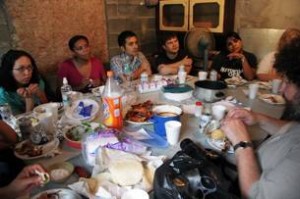Life at the Border
by Cynthia N. Edwards (NIU 1st year student in 2006) from the delegation to Reynosa, Tamaulipas, October 13-15, 2006

Photo courtesy of Christina Murray
In October 2006, I participated in a delegation to the U.S.-Mexico border. As part of the 12 person delegation, which was partly organized by a professor at Northern Illinois University’s College of Law I traveled to Reynosa, Tamaulipas, Mexico, a town on the U.S.-Mexico border that is next to McAllen, Texas. The group was comprised of the professor, three other students at my law school, and National Lawyers’ Guild lawyers and staff.
The purpose of the trip was to meet Mexican factory workers and hear about their experiences working in American owned factories on the border, called maquiladoras, which owe their existence to the North American Free Trade Agreement. While in Mexico and through a workers’ activist organization called the CFO (Comite Fronterizo de Obreras) I met several workers, some who had been injured at work from unsafe conditions at the Emerson factory, others who were struggling to live on the minimal salaries they earned working at a factory, and others who were laid off from Delphi Electronics, because they couldn’t afford to buy the closed-toe shoes their jobs required. A significant number of the workers were single mothers who told of working long hours to earn enough money to survive while also struggling to find appropriate childcare for their children.
One part of the trip involved having a meal in the home of a former maquiladora worker, Alejandra, whom with a group of other Delphi workers some years past had pressed a grievance charge for unfair treatment by their employer and union. She had won her request for backpay and proper severance benefits and had used the settlement money to start a business of her own, a taco stand. In the end, the trip to the border allowed me to better understand corporate globalization, learn about Mexico’s economy and the role of Mexican Federal Labor Laws.
Being at the border was a life-changing experience. It showed me the truth about life for maquiladora workers. Many of the maquiladora workers worked long hours yet still could not afford the necessary things in life. Most workers lived in small one-level houses with few rooms. It was amazing to actually go into their houses and see how they live day-to-day. One bathroom I used only had a bed sheet as the bathroom door, no light or mirror and no toilet seat. It was unbelievable to hear people’s first-hand stories and then see the reality of those stories.
I’ve been interested in Latino culture since I took an introductory Spanish class in middle school. Taking this trip to the border helped me learn about the pitfalls of corporate globalization at the U.S.-Mexican border and also helped me understand why many workers choose to come to the U.S. for better work. Once I earn my J.D. I plan to assist companies in establishing policies and programs that follow government regulations and help businesses deal with international issues such as short-term work assignments and creating companies abroad and assisting families in relocation abroad. My trip to Reynosa solidified my future interests, and I am grateful that I was part of such an exhilarating experience.
